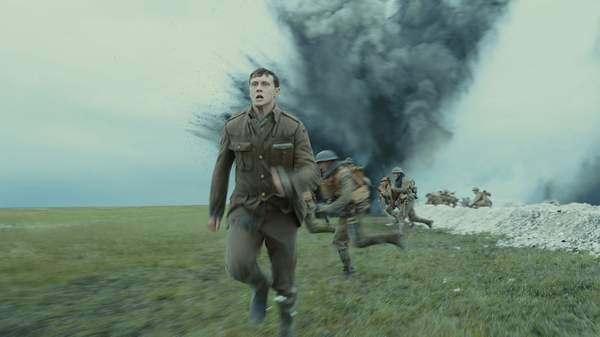Overview
If you didn't already know that 1917's Sam Mendes directed the last two Bond films, then his new First World War drama makes that plain via its high-stakes plot. The premise: in the penultimate year of the conflict, with a generation of young men at battle, two British soldiers are dispatched into enemy territory to deliver a message. If they don't make it through No Man's Land, across lines of barbed wire, out of booby-trapped mines, over collapsed bridges and past ever-determined Germans — and do so by dawn the next day — 1600 men will charge into a battle that'll wipe them all out. Tragic on its own merits, that needless loss of lives would also severely hamper the Allies' overall efforts.
In attempting their crucial task, 1917's central pair can't rely on exploding watches, missile-shooting cars or other 007-style gadgets, of course. Still, the film does sport a particularly action-packed idea in a genre — aka war flicks — that's typically filled with fights, gunfire and explosions anyway. Sending its heroes on a tumultuous journey in the most literal of senses, 1917 also spins a classic adventure narrative within its combat-riddled confines. But, co-scripting with Krysty Wilson-Cairns (Penny Dreadful) and dedicating the feature to his grandfather, a veteran of the war in question, Mendes can be forgiven for taking a minor leaf out Skyfall and Spectre's books. Charting the experiences of Lance Corporals Blake (Dean-Charles Chapman) and Schofield (George MacKay), his film endeavours to show the on-the-ground horrors of war through the duo's gruelling quest. The storytelling gimmickry is obvious, jamming in chaos and peril across a wealth of scenarios, but the overall impact is inescapably immense and heartbreakingly intense. What Dunkirk did for a pivotal World War II event, 1917 does just as commandingly for an entire earlier war.
The date is April 6 in the film's eponymous year. First seen stealing a rare moment's rest in a flower-strewn northern France field, Blake and Schofield are soon sent on their not-so-merry way. "Pick a man. Bring your kit", the especially boyish Blake is told, chosen for the mission because his older brother is in the battalion about to chase the seemingly retreating Germans. As weighs heavily in the air during the ensuing trek, the warier, world-wearier Schofield is merely the friend in Blake's closest proximity when the latter receives his orders.
Instantly, Thomas Newman's nerve-rattling score kicks into gear. Beginning their walk in the muddy British trenches, Blake and Schofield's hurried footsteps, breaths and snippets of small talk are accompanied by needling beats that echo with tension and urgency. The music sets the appropriate mood, although the movie's second overt piece of gimmickry does that as well — and strikingly. As lensed by Blade Runner 2049's Oscar-winning cinematographer Roger Deakins (who, like Newman, also worked with Mendes in his Bond years), 1917 is crafted to look like it's shot in two long takes. Constantly roving and roaming, the film's visuals capture the two soldiers' every move, rarely letting either man's face out of sight.
Accordingly, youth and eagerness, pain and sorrow, and carnage and death all flicker across the screen as Blake and Schofield try to make their way through a gruelling ordeal — one that plays out without any reprieve for them or for the audience. When a filmmaker leans so heavily upon such a self-imposed technical constraint, it's usually in the service of immediacy and immersion, with both evident in every exquisitely choreographed and staged second of 1917. Son of Saul, the Academy Award-winning 2015 holocaust film, used the same faux single-shot approach to the same emotionally devastating effect. Single-setting survivalist thrillers like All Is Lost deliver a similar emotional onslaught via restrained means as well. Both cast a shadow over 1917, because there's nothing more harrowing than being forced to stare into someone's eyes when they're enduring utter hell.
MacKay, a certain future star going from strength to strength, conveys every iota of Schofield's grit and suffering. It's a performance on par with his second film screening in cinemas at present — True History of the Kelly Gang, where he plays Ned Kelly. Here, his character is an everyman, representing the many that went through the real-life ordeal. Indeed, he looks like he could've easily stepped out of Peter Jackson's recent World War I documentary They Shall Not Grow Old. But thanks to MacKay's quietly aching portrayal, the audience needn't know much about Schofield to see him as individual, rather than merely one of many. Amid a cast that also features Colin Firth, Mark Strong, Benedict Cumberbatch, Fleabag's Andrew Scott and Chapman's Game of Thrones co-star Richard Madden in bit parts, he's the face of the so-called 'war to end all wars' — and he's just as effective as Mendes' jam-packed narrative and Deakins' stunning cinematography. And, he helps makes 1917's unshakeable case. Whether scrambling along a Turkish hillside in Gallipoli, sailing into the jungle in Apocalypse Now, or meandering over piles of bodies and past despairing soldiers here, the strongest war movies always function as anti-war movies. As illustrated in visceral detail, this is one of them.
